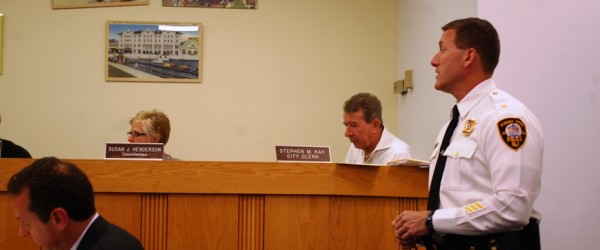Public pushes for police dept. oversight
Requests for civilian review board continue
Members of the public continued to request that the city implement a civilian review board at the Sept. 5 council meeting.
A civilian review board [CRB] — also known as a citizen review board or a civilian complaint review board — is a group of citizens who look into the public’s complaints against the police department and may make disciplinary recommendations to the department if applicable. CRBs are in effect in Pittsburgh, New York City and Baltimore. Atlantic City also implemented a CRB in May.
Asbury Park citizens have often requested a CRB be implemented to deal with civilian complaints about police conduct. Police Chief Mark Kinmon held a chief’s advisory meeting on Aug. 23 and described the department’s internal affairs process to attendees. At that meeting, he said the police department handles internal affairs like police conduct on its own, and privacy issues prevent the city from implementing a CRB.
COMMENTS FROM THE PUBLIC
At last week’s meeting, Park Avenue resident Randy Thompson was the first citizen to speak about implementing a CRB during public comment. Thompson claimed his family was repeatedly harassed by another city resident and when he tried to make a formal complaint at the police department, an officer advised him not to.
“He said, ‘That’s my relative, you’re not going to file a complaint,'” Thompson said. “A person who has coercive power, with a weapon, tells me not to file a complaint. He says he’s gonna handle it on the back side.”
Thompson contacted internal affairs, and another officer said they could not identify the officer in question. According to city manager Terence Reidy, the investigation of that case is still open so public officials cannot comment on it.
Mattison Avenue resident Myra Campbell said she, too, has “been in a situation where internal affairs did not properly investigate … It’s also a situation where people who want to abuse their powers as police officers have an opportunity to do so.”
She suggested a CRB would enable the city to “weed out those who should not be in the police department, and elevate and give recognition to those officers who are doing a good job.”
Duanne Small also spoke in support of a CRB.
“No one should be allowed to police themselves,” he said. “There’s no accountability … [A CRB] would build trust in the community and keep police honest.”
Small also said the Federal Bureau of Investigation [FBI] was brought in to resolve racial turmoil within the department several years ago, but city manager Terence Reidy said that was not the case. Rather, the state attorney general’s office came in at the department’s invitation.
“There are racial issues in this country, we all know that,” Reidy said. “But the biggest problem they found in the police department had nothing to do with race. It had to do with communications and personality, and that was the beginning of some excellent work.”
Third Avenue resident Joe Woerner also voiced support of a CRB.
“I’m a big supporter of the police and the work they do in town,” he said. “This is a challenging town. But they are a powerful force in this town and any powerful force needs to have some accountability … It’s not good guys versus bad guys. It’s a matter of business. If the police are doing a good job they should have nothing to hide from a CRB.”
One resident, Martin Marino Jr., said he opposes a CRB.
“Cities with review boards are cities where the police force is out of control,” he said. “I haven’t heard one thing to make me believe a CRB would do anything but make the situation worse.”
THE CITY’S RESPONSE
Police Chief Mark Kinmon was unavailable for comment this week but city manager Terence Reidy spoke out in defense of the chief’s plans to continue without a CRB.
“I support Mark [Kinmon] in his position and it’s not something we’ve taken lightly,” Reidy said. “He makes efforts to reach out to the community, share information and be as transparent as he possibly can within the law.”
Reidy urged citizens with concerns to attend the chief’s advisory meetings. Kinmon has said he may hold another meeting later this month. Also, Reidy does not feel the police department receives enough comments about officer conduct to necessitate a CRB.
“The number [of complaints] is small in comparison to the number of contacts we have,” he said. “Part of our economic development strategy is to invite tens of thousands of people into the city every motnh, and with all the issues they bring, we’ve got a very ,very small number of people filing complaints.”













